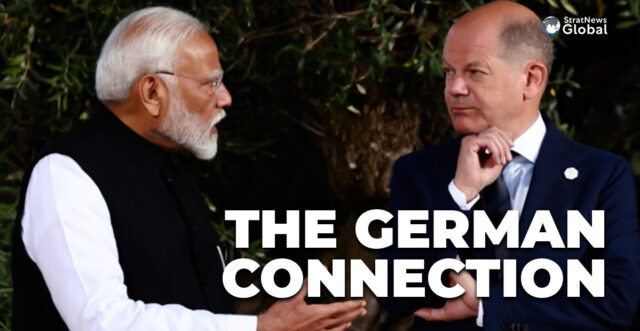
German Chancellor Olaf Scholz’s state visit to India from October 24-26, 2024 for the 7th Intergovernmental Consultations (IGC), will mark a significant attempt to rework and strengthen the strategic partnership by mapping it against fresh global challenges.
The visit comes at a time of significant global geopolitical shifts, and the rise of India and China. It also comes at a time when the Ukraine and the Middle East crisis have led to deep social and political churn both across and within European nations, including Germany.
Scholz’s visit should thus be seen the context of a broader recalibration of Germany’s global strategy.
Germany and India became strategic partners in 2000, underlining deep cultural and academic ties which pre-date India’s independence in 1947. But despite the long-standing friendly relationship, there is immense scope for deepening mutually beneficial cooperation across the political, strategic, economic, social, science & technology, academia and military spectrums.
This was the key focus of the India-Germany Foreign Office Consultations, co-chaired by Foreign Secretary Vikram Misri and his German counterpart, State Secretary of German Foreign Office, Dr. Thomas Bagger, on July 15 in New Delhi.
Apart from exchanging views on “on key issues of regional and global importance…The two sides agreed to further deepen and diversify bilateral ties in key areas of contemporary relevance such as emerging technologies, digital platforms, renewable energy, green economy and extending development cooperation to third countries,” said an MEA release after the Misri-Bagger talks.
Focus on India, a 32-page white paper adopted by the German government earlier this month, marks an important shift in Germany’s engagement with India and The Global South.
On October 16, Germany’s Cabinet adopted the key strategic document Focus on India which outlines the future direction of bilateral relations with . Priority areas include cooperation in the area of foreign & security policy, dev. cooperation, climate & environmental protection,… https://t.co/ULaXzGwwai pic.twitter.com/0nPjUOEMWS
— Kubernein Initiative (@Kubernein) October 23, 2024
The document lays particular stress on the Economic Partnership, particularly in areas like digital transformation, green energy, and advanced manufacturing sectors.
Germany is India’s largest trading partner in the European Union, with bilateral trade reaching $26.48 billion in 2023-24. However, both sides see potential for further growth, especially in high-tech sectors, renewable energy, and manufacturing.
Strategic Cooperation, including joint exercises and capacity-building measures in sectors like maritime security, is a core element of the Indo-German partnership, it notes.
It also underlines collaboration on climate initiatives, including green hydrogen, sustainable infrastructure, and the preservation of biodiversity to meet global environmental challenges
Long hesitant to engage robustly in military affairs due to its post-World War II stance, Germany has recently adopted a more proactive defence policy, spurred by Russian expansionism in Europe and Chinese assertiveness in the Indo-Pacific.
Scholz’s visit is set to deepen military exchanges, with discussions likely to cover reciprocal access arrangements for Indian and German armed forces and increased naval cooperation, particularly in the Indo-Pacific.
Germany’s Indo-Pacific deployment, underscored by the scheduled port call of the German naval frigate Baden-Wuerttemberg in Goa, signals Berlin’s increasing interest in the region’s security dynamics.
Also, Germany’s willingness to assist India in developing its domestic defence industry, including potential submarine projects like Project 75 aligns with India’s vision of becoming a global defence manufacturing hub and reducing its dependence on imports.
Economically, as Germany seeks to reduce its reliance on China, India offers a key alternative. The emphasis on economic diversification is expected to feature prominently in the discussions, with Scholz arriving with a large business delegation.
Scholz will also take part in the 18th Asia-Pacific Conference of German Business (APK 2024) in New Delhi, to interact with over 650 top CEOs and executives from Germany, India, and the Indo-Pacific.
Germany bets on India to reduce reliance on China – Economy – The Jakarta Post #jakpost https://t.co/Y3HVGWxuVr pic.twitter.com/5tBdJ5He7c
— The Jakarta Post (@jakpost) October 23, 2024
German companies are keen on expanding their presence in India, particularly in sectors like manufacturing, infrastructure, and clean energy. For India, Germany’s advanced technological capabilities, particularly in green technology and manufacturing, offer significant opportunities to boost its own industrial base.
Another important focus during Scholz’s visit will be labour migration and mobility.
Germany, facing demographic challenges with an aging and shrinking population, has turned to skilled migration as a solution. Focus on India highlights the need for increased recruitment of skilled labour from India, particularly in fields like healthcare, engineering, and IT.
The Migration and Mobility Agreement signed between the two countries in 2022 has already led to a 25% increase in Indian workers in Germany. Scholz’s visit is expected to further this momentum, with discussions likely to include measures to make it easier for skilled Indian workers to migrate to Germany, as well as initiatives to expand German language training in India.
Differences remain, particularly over India’s stance on the Ukraine war. But Berlin and New Delhi seem to have agreed to disagree over certain issues, while strengthening ties in areas where the two nations have similar positions.
In a career spanning three decades and counting, Ramananda (Ram to his friends) has been the foreign editor of The Telegraph, Outlook Magazine and the New Indian Express. He helped set up rediff.com’s editorial operations in San Jose and New York, helmed sify.com, and was the founder editor of India.com.
His work has featured in national and international publications like the Al Jazeera Centre for Studies, Global Times and Ashahi Shimbun. But his one constant over all these years, he says, has been the attempt to understand rising India’s place in the world.
He can rustle up a mean salad, his oil-less pepper chicken is to die for, and all it takes is some beer and rhythm and blues to rock his soul.
Talk to him about foreign and strategic affairs, media, South Asia, China, and of course India.




